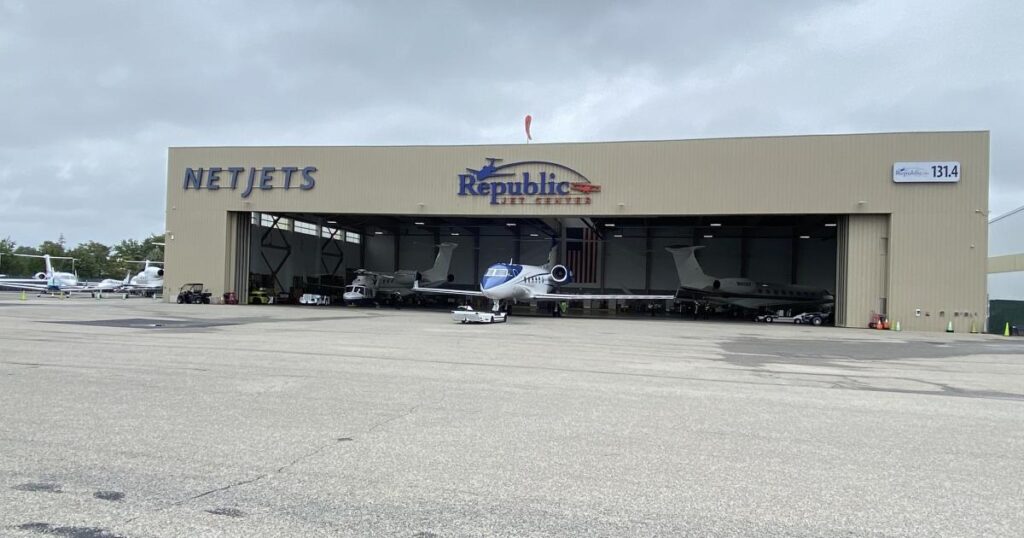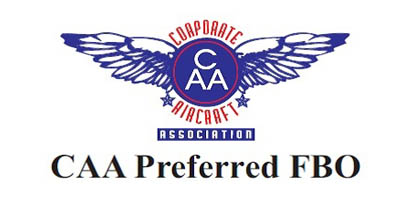Republic Jet Center (RJC), one of three service providers at New York City-area general aviation hub Republic Airport (KFRG), has made quite a name for itself since it opened in 2014. According to company president Garry Madolid, the independent FBO is on track to pump more than three million gallons of fuel this year, more than half of the airport’s total, and a 10 percent increase from a year ago, continuing the rising trend in fuel volume since the Covid period.
The company occupies two leaseholds at KFRG consisting of 12 acres (including ramp). RJC West is home to the FBO’s based tenants and is used by major operators such as Jet Edge, XO, and NetJets. It has a 30,000-sq-ft heated hangar that can accommodate aircraft up to the size of a Gulfstream G650. That structure is home to seven based jets, while a 33,000-sq-ft hangar is leased to aircraft charter, management, and maintenance provider Talon Air, which operates a floating fleet of 35 aircraft.
The 2,000-sq-ft multilevel terminal includes a passenger lounge with a refreshment bar and flavored-water dispenser, a pilot lounge, a well-furnished catering galley kitchen, a 10-seat A/V-equipped conference room, tenant offices, and a dedicated NetJets lounge adjacent to the hangar, complete with its own conference room and restroom.
RJC North on the other side of the field opened in 2018 and consists of a cozy 1,500-sq-ft terminal. It is constructed from several former shipping containers, although that is virtually impossible to detect unless you know what you are looking for. It features a passenger lounge/lobby, crew lounge/flight planning area, bathrooms, and several offices. It handles the bulk of the FBO’s transient business traffic as well as all of its light GA activity. The company can accommodate anything up to the size of a Boeing 757 on its ramp and has a storage shed with the equipment to do so including airstairs, a belt loader, and even an air start cart, which it occasionally rents out to FBOs at other area GA airports. Both locations offer onsite car rentals.
The company’s World Fuel Services-supplied fuel farm is adjacent to the west facility and offers 90,000 gallons of jet-A storage in vertical tanks, along with a 10,000-gallon 100LL tank. It is served by four 5,000-gallon jet-A tankers and a pair of 1,500-gallon-capacity avgas refuelers. The FBO is open 24/7 year round and provides Type I and Type IV deicing with its own equipment.
U.S. Customs service is provided at the airport’s main terminal/administration building next to RJC’s north ramp, and arriving flights require at least four hours’ prior notice. Customs service is available from 11 a.m. until 8 p.m., and RJC is authorized to provide fuel service on the customs ramp.
Rather unique among service providers at airports in metropolitan areas, RJC still has 60 acres of space to develop, and as a result the company just broke ground on a $28 million flagship facility, which will replace the current north location. Slated for completion by the end of 2024, it will give the north location its first hangar space, with 55,000 sq ft capable of sheltering the latest ultra-long-range business jets, a modern terminal with the latest amenities including a café, and eight acres of ramp.
Situated between New York City and the upscale enclaves of eastern Long Island, the FBO has partnered with a helicopter operator to provide quick shuttle flights to the two destinations. RJC will also provide ground transport to customers for a nominal charge.
Madolid noted that the FBO’s peak season formerly extended from Thanksgiving through Easter, but it now covers nearly half the calendar, from the beginning of November through Mother’s Day in May.
The company owner’s passion for aviation began with piston-powered aircraft, and that background permeates its customer service philosophy, according to Madolid. “Some places kind of dismiss the pistons, saying, ‘We’re not going to make a lot of money off them,’ but we’ve always told our team, ‘A customer is a customer is a customer. It doesn’t matter what type of equipment they are flying in on, you have to treat them all the same.'”
Curt Epstein – AIN, Senior Editor











